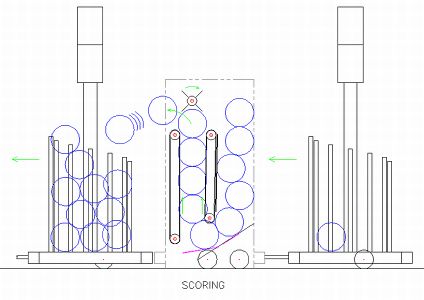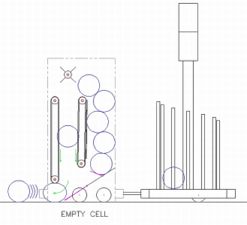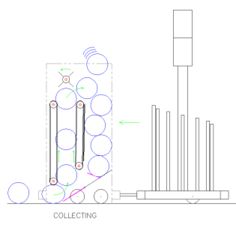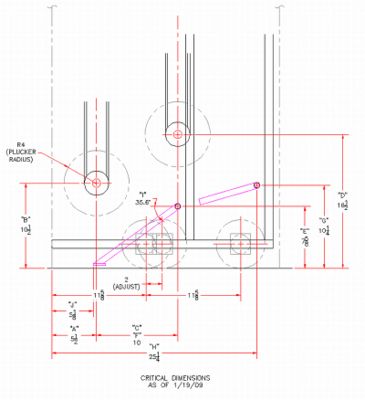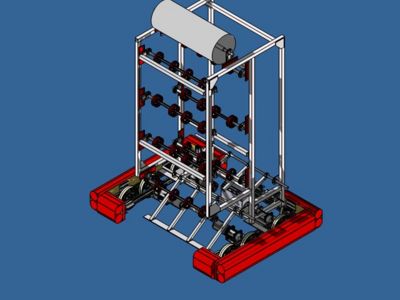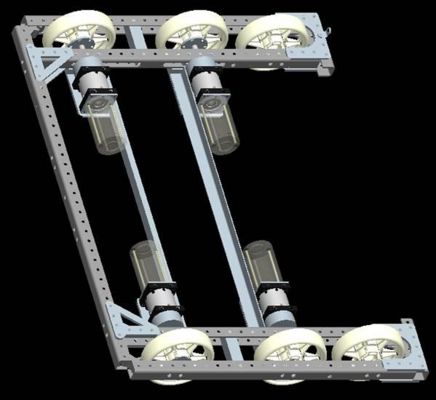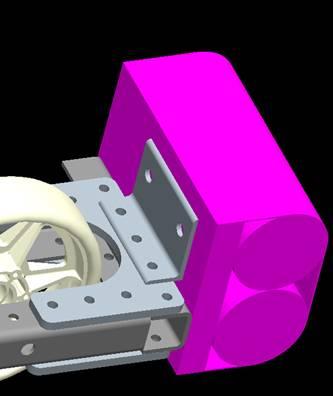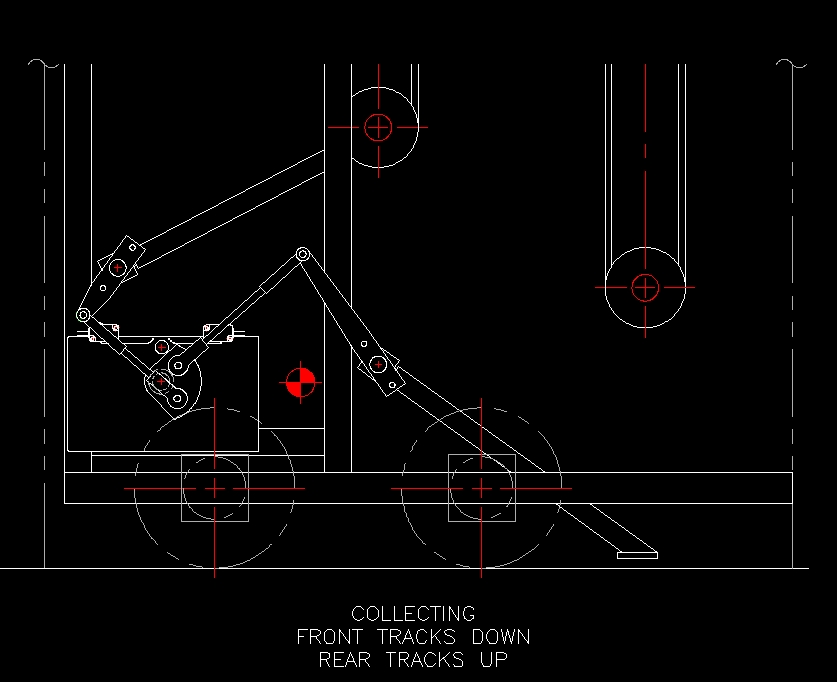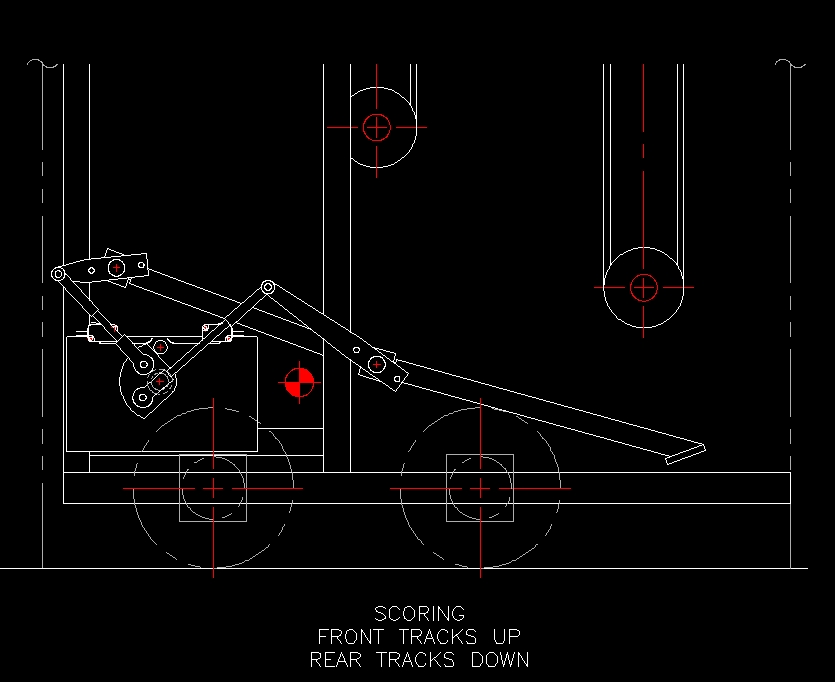2009:Robot Design Details: Difference between revisions
From 1511Wookiee
Jump to navigationJump to search
Leadership (talk | contribs) (Removed "Need to have made" parts as they are all made) |
m (Robot Design Details moved to 2009:Robot Design Details) |
||
| (31 intermediate revisions by 8 users not shown) | |||
| Line 3: | Line 3: | ||
General layout design of the robot, Dimensions ARE NOT exact. | General layout design of the robot, Dimensions ARE NOT exact. | ||
[[Image:Scoring 1.jpg|424x300px]] [[Image:Empty Cell 1.jpg|247x225px]] [[Image: | [[Image:Scoring 1.jpg|424x300px]] [[Image:Empty Cell 1.jpg|247x225px]] [[Image:Collecting 1.jpg|236x225px]]<br> | ||
[[Image:Dimensions 1-19-09.jpg|400x400px]][[Image:Robot_2_1-25-2009.jpg|400x300px]] | |||
*4-wheel drive | == Drivetrain<br> == | ||
*Banebots Transmissions | |||
* | *4-wheel drive(6 if needed)<br> | ||
*Four Banebots 12:1 Transmissions | |||
*Four 2.5" CIM motors | |||
*Victor 884 [Drive] Speed Controllers | *Victor 884 [Drive] Speed Controllers | ||
*Fixed wheels (slip-style steering)<br> | *Fixed wheels (slip-style steering)<br> | ||
*Banebots encoders on each wheel (http://banebots.com/pc/ELECTRONICS/EN-G0561-KT) -- mounted at transmission outputs. | *Banebots encoders on each wheel (http://banebots.com/pc/ELECTRONICS/EN-G0561-KT) -- mounted at transmission outputs. | ||
*27.25” LONG x 37.25” WIDE<br> | *27.25” LONG x 37.25” WIDE<br> | ||
*Rear wheel axis at 5.625 from most rear surfaces (adjustable down to 4.625 corner brace regime permitting) <br> | *Rear wheel axis at 5.625 from most rear surfaces (adjustable down to 4.625 corner brace regime permitting) <br> | ||
*Front wheel axis at 11.625 from front most surfaces (adjustable ± 2.00”) | *Front wheel axis at 11.625 from front most surfaces (adjustable ± 2.00”)<br> | ||
* | *Using 3/8" bolts to mount bumpers to the frame. See drawing below for bumper mount details. | ||
* | *Spacers used will be copper pipe cut to the correct length to space wheels on the axel. | ||
* | *6 hole patterns in the wheels need to be tapped for 10-32 screws 3/4" deep | ||
* | *No stiffener element between the wheels seems to be needed. | ||
* | *Trailer hitch is assembled from KOP items. | ||
* | *Determination of need to mount dummy wheels will occur once the top portion of the robot is assembled. | ||
*Dummy wheels will be supported using 3/8" bolt, length TBD. | |||
*Bearings will be inserted in the dummy wheels from the kit of parts. | |||
[[Image:Drivetrain 1-14-2009.JPG|500x400px|Current Drivetrain design as of 01/14/2009]]<br> | |||
[[Image:Bumper Bracket.JPG]]<br> | |||
== Front Ball Entry/Exit == | |||
*Ball intake/expulsion power provided by "chicken pluckers" on front conveyor - see conveyor. | |||
*Passage controlled by "door" (TBD - need details) | |||
*Front opening dimensions (TBD) | |||
[[Image:Red flag.gif|Please Update!]] | |||
*Powered by same motor, speed controller as ball hopper trap door (see below).<br> | |||
*Two [http://sccatalog.honeywell.com/pdbdownload/images/v7-2b17d8-048.pdf Limit Switches] to tell when door is in open/closed position | |||
[[Image:Limit Switches Collecting.jpg]] | |||
<br> | [[Image:Limit_Switches_Scoring.jpg]]<br> <br> <br> | ||
== Ball Hopper == | == Ball Hopper == | ||
| Line 40: | Line 55: | ||
*Entry from conveyor at top of robot; entry controlled by upper ejector | *Entry from conveyor at top of robot; entry controlled by upper ejector | ||
*Exit is a "trap door" at the bottom of the hopper down to the area behind the lower ball collector and at the base of the conveyor system. | *Exit is a "trap door" at the bottom of the hopper down to the area behind the lower ball collector and at the base of the conveyor system. | ||
*Trap door | *Trap door powered by Nippon Denso Window motor (along with lower collection blocker) | ||
*Two Limit Switches | *Two [http://sccatalog.honeywell.com/pdbdownload/images/v7-2b17d8-048.pdf Limit Switches] to tell when door is in open/closed position | ||
*Jaguar speed controller | *Jaguar speed controller | ||
| Line 47: | Line 62: | ||
*Two conveyors opposite each other, working together to move balls from ball intake and/or below the ball hopper up to the upper ball ejector/hopper entry point. | *Two conveyors opposite each other, working together to move balls from ball intake and/or below the ball hopper up to the upper ball ejector/hopper entry point. | ||
*Powered by two independent motors ( | *Front conveyor also acts as collector to bring outside balls in via "chicken pluckers" on lower roller of conveyor | ||
* | *Powered by two independent motors (Fischer Price** motors with [http://banebots.com/pc/MP-36XXX-545/MP-36025-545 25:1 reduction gearboxes]) **Changed from RS-545 | ||
*Jaguar speed controller | *Likely NOT direct drive, will likey be chain/sprocket to save space and move weight back on robot | ||
*Banner Sensors (photoelectric): [http://www.bannerengineering-online.com/pdf/Banner%20Q10.pdf Q10RP6R] Reciever and [http://www.bannerengineering-online.com/pdf/Banner%20Q10.pdf Q106E] Source Mounted at the top of conveyor to detect ball "ready to fire" | |||
*2 [http://www.iprocessmart.com/Omron_cd/PDF/D21SPY415199.pdf Omron ]photoelectric sensors arranged with a small wheel used to determine conveyor speed. One disk/sensor per conveyor. | |||
*Jaguar speed controller | |||
<br> | <br><br> | ||
== Upper Ball Ejector == | == Upper Ball Ejector == | ||
*Spinning ejector directs, based on direction, balls out of robot or in to hopper entry point. | *Spinning ejector directs, based on direction, balls out of robot or in to hopper entry point. | ||
*Powered by | *Powered by RS-545 Banebots** motor with plastic gearbox removed and 25:1 reduction gearbox added (same Banebots units as on conveyor drives) ** changed from Fischer Price | ||
*Will be chain/sprocket to save space and move weight back on robot, and to allow optimization of ejector speed without loss of motor power | |||
*Shaft encoder sensor ([http://usdigital.com/assets/general/91_e7p_datasheet_1.pdf E7P-180-375-S-H-G-3]) to monitor rotational speed (180 CPR). Requires 3/8" shaft. If we can't get [http://usdigital.com/assets/general/91_e7p_datasheet_1.pdf E7P] in time, we may have to use E4P model which requires 1/4" shaft | |||
*Jaguar speed controller | *Jaguar speed controller | ||
Latest revision as of 11:50, 4 January 2010
Main Robot Design
General layout design of the robot, Dimensions ARE NOT exact.
Drivetrain
- 4-wheel drive(6 if needed)
- Four Banebots 12:1 Transmissions
- Four 2.5" CIM motors
- Victor 884 [Drive] Speed Controllers
- Fixed wheels (slip-style steering)
- Banebots encoders on each wheel (http://banebots.com/pc/ELECTRONICS/EN-G0561-KT) -- mounted at transmission outputs.
- 27.25” LONG x 37.25” WIDE
- Rear wheel axis at 5.625 from most rear surfaces (adjustable down to 4.625 corner brace regime permitting)
- Front wheel axis at 11.625 from front most surfaces (adjustable ± 2.00”)
- Using 3/8" bolts to mount bumpers to the frame. See drawing below for bumper mount details.
- Spacers used will be copper pipe cut to the correct length to space wheels on the axel.
- 6 hole patterns in the wheels need to be tapped for 10-32 screws 3/4" deep
- No stiffener element between the wheels seems to be needed.
- Trailer hitch is assembled from KOP items.
- Determination of need to mount dummy wheels will occur once the top portion of the robot is assembled.
- Dummy wheels will be supported using 3/8" bolt, length TBD.
- Bearings will be inserted in the dummy wheels from the kit of parts.
Front Ball Entry/Exit
- Ball intake/expulsion power provided by "chicken pluckers" on front conveyor - see conveyor.
- Passage controlled by "door" (TBD - need details)
- Front opening dimensions (TBD)
- Powered by same motor, speed controller as ball hopper trap door (see below).
- Two Limit Switches to tell when door is in open/closed position
Ball Hopper
- Open top entry for human player introduction
- Entry from conveyor at top of robot; entry controlled by upper ejector
- Exit is a "trap door" at the bottom of the hopper down to the area behind the lower ball collector and at the base of the conveyor system.
- Trap door powered by Nippon Denso Window motor (along with lower collection blocker)
- Two Limit Switches to tell when door is in open/closed position
- Jaguar speed controller
Ball Conveyor
- Two conveyors opposite each other, working together to move balls from ball intake and/or below the ball hopper up to the upper ball ejector/hopper entry point.
- Front conveyor also acts as collector to bring outside balls in via "chicken pluckers" on lower roller of conveyor
- Powered by two independent motors (Fischer Price** motors with 25:1 reduction gearboxes) **Changed from RS-545
- Likely NOT direct drive, will likey be chain/sprocket to save space and move weight back on robot
- Banner Sensors (photoelectric): Q10RP6R Reciever and Q106E Source Mounted at the top of conveyor to detect ball "ready to fire"
- 2 Omron photoelectric sensors arranged with a small wheel used to determine conveyor speed. One disk/sensor per conveyor.
- Jaguar speed controller
Upper Ball Ejector
- Spinning ejector directs, based on direction, balls out of robot or in to hopper entry point.
- Powered by RS-545 Banebots** motor with plastic gearbox removed and 25:1 reduction gearbox added (same Banebots units as on conveyor drives) ** changed from Fischer Price
- Will be chain/sprocket to save space and move weight back on robot, and to allow optimization of ejector speed without loss of motor power
- Shaft encoder sensor (E7P-180-375-S-H-G-3) to monitor rotational speed (180 CPR). Requires 3/8" shaft. If we can't get E7P in time, we may have to use E4P model which requires 1/4" shaft
- Jaguar speed controller
